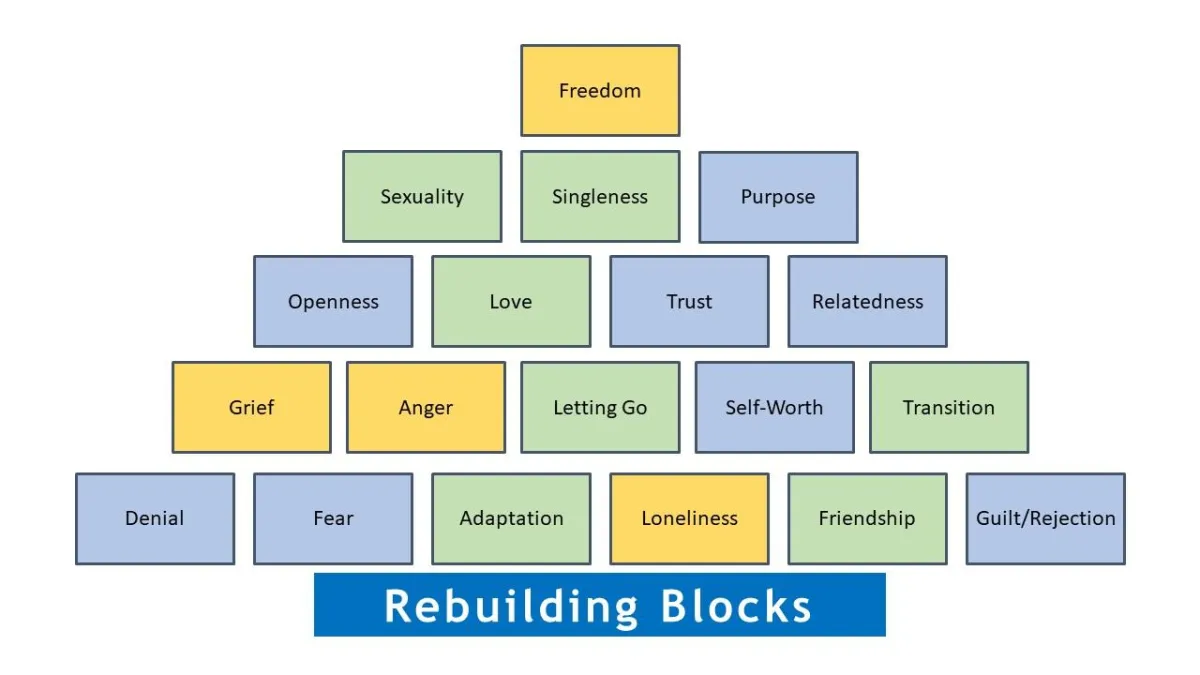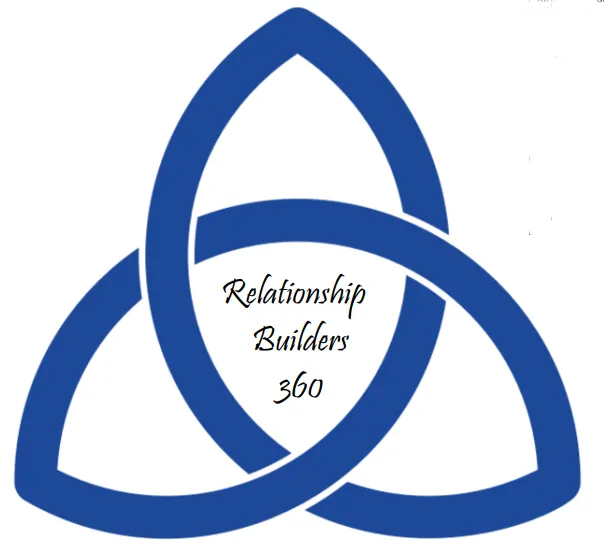The Rebuilding Seminar
What is it?
The Rebuilding Seminar is a 10-week Relationship Recovery Program.
The Rebuilding seminar is based on Dr. Bruce Fisher’s best-selling book Rebuilding: When Your Relationship Ends.
The in person group meets on Madison's west side on Tuesday evenings from 6:00 to 9:00 pm. Participants may also attend the group via live feed over Zoom.
Each week you will walk through the 19 Rebuilding Blocks. You will learn new information, do activities in class, and discuss the topic of the week with your peers and led by Margaret, your class facilitator.
You will have homework, 1-2 hours per week outside of class. You will get to know your class mates both in class and develop learning partnerships outside of class.
The 3 Components of the Proven Program
There's no limit to circumstances and obstacles that arise in life, and there's very little that we can't help within regards to the emotional wounds of divorce. It has been said that divorce is the second most difficult situation in life. Dealing with it takes the right combination of support, information and guidance.
At the end of the day, heartbreak is heartbreak. It leaves no one untouched. Whether you are early in the process or divorced for 20 years the wounds need to healed. Nevertheless there are unique circumstances depending on where you are in the process.

Proven Content
No other program in the world has the track record of the Rebuilding Seminar. Millions of people have relied on the information by Dr. Bruce Fisher. Over the last 40 years the program has been refined to deliver the best information so that you get results, quickly. Rebuilders 360 offers valuable tools and information delivered weekly.
Weekly Rebuilding Topics-
GRIEF AND DENIAL
FEAR AND ANGER
ADAPTATION AND TRANSITION
GUILT AND REJECTION
LONELINESS AND FRIENDSHIP
TRUST AND OPENNESS
SELF-WORTH
LETTING GO AND LOVE
RELATEDNESS AND SEXUALITY
SINGLENESS AND PURPOSE

Supportive Community
The Rebuilding Seminar is a supportive, encouraging environment.
We have guidelines in place to create the right atmosphere for growth and honest, vulnerable communication.
You can be yourself and learn from others. You work together, getting and giving perspective.

Expert Coaching
Your class facilitator Margaret is a highly trained expert, and has travelled the recovery process herself. She understands the thoughts, feelings and experiences which can arise on your recovery journey.
As your coach and mentor, Margaret can help guide you as you go forward.
Ready to Get Started? Enroll Now.
Let's Start Rebuilding. Together.
You don't have to do this alone. You aren't the only one going through this. With the right combination of community, coaching, and content you can dramatically rebuild your life. You can be happy and looking forward to the next chapter. How will you Rebuild?
Stay up to date
Ready to continue Rebuilding and Building? Stay up to date on the latest news, articles, and blogs.

In Pursuit of Wellness
In Pursuit of Wellness

When you think about health care, what comes to mind? For some, it’s a pursuit of wellness connecting mind, body, and spirit. For others, health care is like a car’s transmission – you don’t really notice or appreciate it until it’s making a noise, or completely broken.
People in the middle of a crisis or transition in a significant relationship can feel especially stressed, which we all know affects our health. Some may find themselves both ill and alone for the first time.
My name is Beth, and I am writing a series of articles designed to help you navigate today’s complex health care system. I am a nurse by training, but several years ago I became interested in the study of “quality” care – especially for patients who are in the hospital. None of what I write will be an endorsement for a particular hospital or care system, nor is any of the content meant to recommend any course of treatment. Simply, I will be giving you information so that you can make educated choices about your own health care. I invite your comments and conversation.
Whether you have visited your local emergency department, or provider/physician clinic, or have been a patient in the hospital recently, you may have received a “patient satisfaction survey” in the mail. The survey often contains questions about the timeliness of your visit, how the food was, or whether it was quiet at night. Most surveys ask about whether your provider or nurse communicated information about your medications or care plan in ways you could understand.
Many insurers, including the federal government (aka Medicare) require certain types of providers or organizations to collect and publicly report the results of these surveys. If you have a specific comment, whether it’s a kudos or complaint, those are forwarded straight to the provider for an opportunity for a direct response to you.
Soon, there will be an additional set of questions that will be included in hospital patient satisfaction surveys. The three new questions are part of a bundle called “Care Transition Measures”. Simply, hospitals are required to prepare you for discharge – whether you are going back home or on to another care setting (like a nursing home). And for good reason! Medicare is now financially penalizing certain hospitals for re-admissions of certain patients within 30 days. Unnecessary re-admissions are costly and dangerous for patients and the health care system.
Let’s have a look at the questions:
Question 1: During this hospital stay, staff took my preferences and those of my family or caregiver into account in deciding what my healthcare needs would be when I left.
Question 2: When I left the hospital, I had a good understanding of the things I was responsible for in managing my health.
Question 3: When I left the hospital, I clearly understood the purpose for taking each of my medications.
Hospitals will be scored on the number of questions that received a “Agree” or “Strongly Agree” in each of the questions multiplied by the number of patients that were eligible to receive a survey. Hospitals will be focusing more and more on equipping patients and their families or other caregivers in how to manage their health issues outside of the hospital. They will work hard to teach and communicate with you, and ask you several times whether you understand what they are trying to show you.
You and your caregivers have the responsibility to speak up, ask questions, and otherwise seek out information, until you are sure that you understand. Are going through a significant change in a relationship, to the extent that you are managing your health all by yourself? You should ask around to find out who might help serve as a healthcare “buddy” for you. Someone who at least knows the basics about where your medication list is, or who your regular provider is. Someone you can call on when you are ill, or who might be okay with listing their name as a contact person should you become hospitalized.
Transitioning out of the hospital can be tricky, whether you are going home or to another care setting. It’s important to have another set of ears, and perhaps another voice if you are not able to speak for yourself. Hospitals are paying attention to how you will be able to cope after you leave. You should do all you can, too.
Contact Us
You’ve already come a long way. Let’s reach the next level together.

Email: info@relationshipbuilding360.com
Address:
6402 Odana Rd,
Madison, WI 53719
Phone:
608-204-6076
